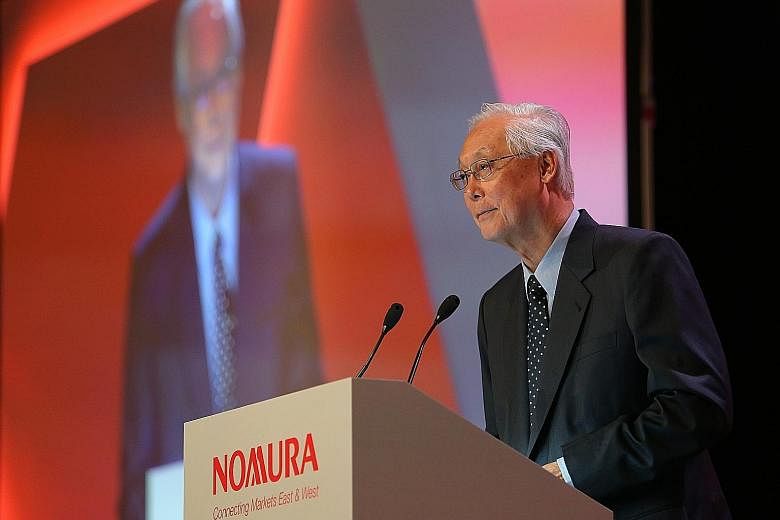Asia's economic potential can be unlocked only through harmonious and inclusive cooperation - and the region's private sector can play a role in developing these linkages.
Emeritus Senior Minister Goh Chok Tong made the observation during a speech at Nomura's Investment Forum Asia yesterday.
He said Singapore is also doing its part through the transformation of its financial services.
"The continued growth and prosperity of Asia is dependent on harmonious, open and inclusive cooperation in the region," Mr Goh said.
But the territorial disputes and lingering mistrust between some Asian countries threaten to stall that agenda. "To me, the answer lies in the private sector's role in building greater economic linkages and inter-dependence between countries in the region. One example is the building up of transport infrastructure and networks across countries."
The private sector can strengthen Asia's trade and financial cooperation by advocating high-standard trade agreements in the works, such as the Trans-Pacific Partnership and the Regional Comprehensive Economic Partnership. Both involve Singapore and Japan as participants.
Against this backdrop, new innovations are afoot here to create a financial hub that can better support Asia's trade and finance.
Mr Goh said: "Last year, Singapore delivered the world's first application of distributed ledger technology of trade finance.
"We are also working on an industry solution to support the transfer of infrastructure debt from banks to investors. Such a facility would improve investor access and help banks recycle capital for new greenfield investments."
The three-day forum was held at The Ritz-Carlton. Japan's State Minister of Finance Manabu Sakai gave an update on "Abenomics".
Opinions on the results of the radical reforms of Prime Minister Shinzo Abe have been mixed, but Mr Sakai stressed that they have enabled Japan to avoid economic "destruction" amid the global slowdown.
He said three years of Abenomics had yielded positive signs, citing a 40 per cent jump in total corporate profits over the period to a new high of about 65 trillion yen (S$820 billion). The jobless rate has been falling steadily, and wage growth last year was the highest in 17 years.
The next phase will focus on giving better childcare and eldercare support to allow greater labour participation. Other policies, including growing public and private spending on research and development, are on the cards.
The efforts will help Japan hit the target of growing GDP to some 600 trillion yen by 2020, up from 500 trillion yen, he said.
Nomura economists speaking at the forum painted a picture of a fragile global growth outlook.
Growth in the United States may yet pick up in the second half despite the disappointing May job figures, but this strongly depends on growth in consumption demand, US chief economist Lewis Alexander said. The Federal Reserve will likely push back the next interest rate hike to September amid the uncertainty, said Nomura's house call.
In China, credit expansion has turned aggressive since the second half of last year, creating structural headwinds for economic reforms. Growth will be 6.2 per cent this year and 5.8 per cent in 2017, China economist Zhao Yang said.
In South-east Asia, while Indonesia is on the cusp of "great revival", Singapore may be a laggard, South-east Asia economist Euben Paracuelles cautioned.


